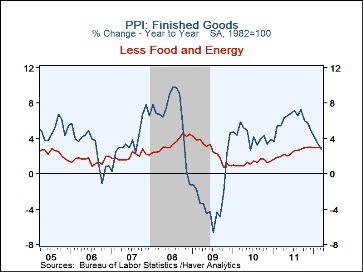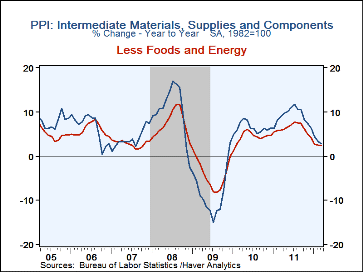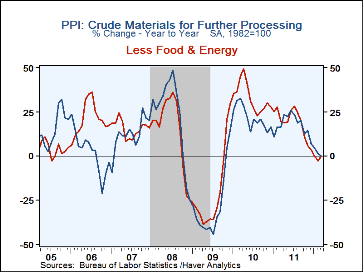 Global| Apr 12 2012
Global| Apr 12 2012U.S. PPI Is Unchanged But Core Remains Firm
by:Tom Moeller
|in:Economy in Brief
Summary
The producer price index for finished goods was unchanged during March following an unrevised 0.4% February gain, below expectations for a 0.3% increase. Inflation pressures, however, were still evident as core pricing power [...]
 The producer
price index for finished goods was unchanged during March following an
unrevised 0.4% February gain, below expectations for a 0.3% increase.
Inflation pressures, however, were still evident as core pricing power
increased. The PPI less food & energy rose 0.3% vs. 0.2% in February.
That was enough to leave the y/y gain at 2.9% versus a 2.4% rise during
all of last year. Expectations had been for a 0.2% March rise.
The producer
price index for finished goods was unchanged during March following an
unrevised 0.4% February gain, below expectations for a 0.3% increase.
Inflation pressures, however, were still evident as core pricing power
increased. The PPI less food & energy rose 0.3% vs. 0.2% in February.
That was enough to leave the y/y gain at 2.9% versus a 2.4% rise during
all of last year. Expectations had been for a 0.2% March rise.
A 1.0% decline (2.7% y/y) in energy prices accounted for the unchanged PPI. Gasoline prices fell 2.0% (+7.1% y/y) while home heating oil costs dropped 1.2% (+6.9% y/y). These declines were partially offset by a 0.7% rise (-8.8% y/y) in residential gas prices. Also rising were food prices. Their 0.2% increase (2.3% y/y) reflected a 12.8% rise (-29.7% y/y) in vegetable prices; beef & veal costs dropped 2.4% (+5.7% y/y).
Finished consumer goods prices slipped 0.1% (+2.9% y/y) after a 0.5% February rise. Less food & energy, consumer goods prices rose 0.3% (3.5% y/y). Within the components, men's apparel prices rose 1.5% (8.0% y/y) while women's clothing costs slipped 0.5% (+1.0% y/y). Household appliance prices rose 0.9%, 5.5% since March of 2011. Passenger car prices rose an increased 0.8% (1.5% y/y). Capital equipment prices gained 0.2% last month and by a steady 2.2% since last March.
Intermediate goods prices jumped another 0.7%. The increase left the y/y rise at a decelerated 2.9% versus last year's 9.1%. Energy prices rose 1.3% last month (4.2% y/y) and food prices rose 0.6% (3.0% y/y) following five months of decline. Core-intermediate prices posted a 0.6% gain (2.4% y/y). Crude materials prices declined 2.5% last month and were unchanged during the last twelve. Energy prices declined 9.2% (-6.0% y/y) while food prices rose 2.8% (5.5% y/y). Prices less food & energy increased 1.1% and were up 0.4% versus last year.
The PPI data are contained in Haver's USECON database with further detail in PPI and PPIR. The expectation figure is available in the AS1REPNA database.
The Economic Outlook and Monetary Policy is yesterday's speech by Fed Vice Chair Janet L. Yellen and it can be found here .
| Producer Price Index (%) | Mar | Feb | Jan | Mar Y/Y | 2011 | 2010 | 2009 |
|---|---|---|---|---|---|---|---|
| Finished Goods | 0.0 | 0.4 | 0.1 | 2.8 | 6.0 | 4.2 | -2.5 |
| Less Food & Energy | 0.3 | 0.2 | 0.4 | 2.9 | 2.4 | 1.2 | 2.6 |
| Food | 0.2 | -0.1 | -0.3 | 2.3 | 6.3 | 3.9 | -1.4 |
| Energy | -1.0 | 1.3 | -0.5 | 2.7 | 15.7 | 13.6 | -17.6 |
| Intermediate Goods | 0.7 | 0.7 | -0.4 | 2.9 | 9.1 | 6.4 | -8.4 |
| Less Food & Energy | 0.6 | 1.0 | -0.1 | 2.4 | 6.2 | 4.3 | -4.2 |
| Crude Materials | -2.5 | 0.4 | 1.5 | 0.0 | 17.4 | 21.4 | -30.3 |
| Less Food & Energy | 1.1 | -0.3 | 0.6 | 0.4 | 18.7 | 32.5 | -23.3 |
Tom Moeller
AuthorMore in Author Profile »Prior to joining Haver Analytics in 2000, Mr. Moeller worked as the Economist at Chancellor Capital Management from 1985 to 1999. There, he developed comprehensive economic forecasts and interpreted economic data for equity and fixed income portfolio managers. Also at Chancellor, Mr. Moeller worked as an equity analyst and was responsible for researching and rating companies in the economically sensitive automobile and housing industries for investment in Chancellor’s equity portfolio. Prior to joining Chancellor, Mr. Moeller was an Economist at Citibank from 1979 to 1984. He also analyzed pricing behavior in the metals industry for the Council on Wage and Price Stability in Washington, D.C. In 1999, Mr. Moeller received the award for most accurate forecast from the Forecasters' Club of New York. From 1990 to 1992 he was President of the New York Association for Business Economists. Mr. Moeller earned an M.B.A. in Finance from Fordham University, where he graduated in 1987. He holds a Bachelor of Arts in Economics from George Washington University.
More Economy in Brief
 Global| Feb 05 2026
Global| Feb 05 2026Charts of the Week: Balanced Policy, Resilient Data and AI Narratives
by:Andrew Cates








